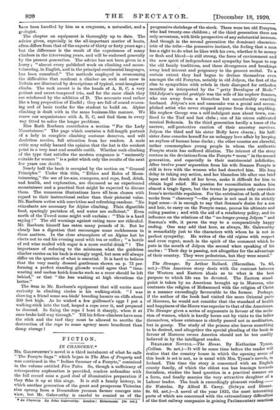FICTION.
IN CHANCERY.•
Ma. GALSWORTEY'S novel is a third instalment of what he calls " The Forsyte Saga" which began in The Man of Property and was continued in the " Indian Summer of a Forsyte," contained in the volume entitled Five Tales. So, though a sufficiency of retrospective explanation is provided, readers unfamiliar with the full record miss a good deal of illuminative preparation if they rake it up at this stage. It is still a family history, in which another generation of the great and prosperous Victorian clan sprung from a Dorsetshire yeoman farmer emerges into view, but Mr. Galsworthy is careful to remind us of the • la Chancery. By John GaLsworthy. London : Heinemann. pee. progressive shrinkage of the stook. There were ten old Forsytes, who had twenty-one children ; of the third generation there are only seventeen, with little prospective of any substantial increase. And though in the second generation the dominant character- istic of the tribe—the possessive instinct, the feeling that a man has a right to do what he likes with his own, whether it be money or flesh and blood—is still strong, the force of environment and the new spirit of independence and sympathy has begun to sap the old family traditions, and these divergences and breakings away lend interest and poignancy to the present recital. To a certain extent they had begun to declare themselves even amongst the old Forsytes, notably in old Jolyon, the first of the clan to sympathize with rebels in their disregard for orthodox morality as interpreted by the " petty Decalogue of Mode." OldJolyon's special protegee was the wife of his nephew Soames, who ran away from a blameless but unendurably exacting husband. Jolyon's son and namesake was a genial and accom- plished artist who never stopped anyone from doing anything. His nephew George was a self-indulgent man about town, con- fined to the Turf and fast clubs ; one of his nieces cultivated musical Bohemia. In the third generation hardly a trace of the narrow, self-protective caution of their ancestry survives. Jolyon the third and his sister Holly have charm ; his half- sister June consoles herself for an unhappy love affair by keeping an asylum of human lame ducks ; the other cousins arc cheerful, rather commonplace young people in whom the authentic Forsyte strain has suffered dilution. The interest of the story centres in the deviations from the Forsyte .-norm" in the second generation, and especially in their matrimonial infelicities. After twelve years' separation from his wife Soames Forsyte is still in love with the woman who had deserted him. His long delay in taking any action, and her blameless life after one brief lapse and the death of her lover, make it difficult for him to obtain legal relief. His passion for reconciliation makes him almost a tragic figure, but the terms he proposes only reawaken Irene's invincible repulsion. For the extrication of both of their necks from " chancery "—the phrase is not used in its strictly legal sense—it is enough to say that Soames's desire for a eon and heir, to carry on the Forsyte name, proves his ultimate and ruling passion ; and with the aid of a retaliatory policy, and its influence on the relations of the " no-longer-young Jolyon " and Soames's wife, it paves the way to a comparatively happy ending. One may add that here, as always, Mr. Galsworthy is remarkably just to the characters with whom he is not in perfect sympathy. He writes of the old regime with respect and even regret, much in the spirit of the comment which he puts in the mouth of Jolyon the second when speaking of his uncles : " Their day is passing, not altogether for the advantage of their country. They were pedestrian, but they were sound."






































 Previous page
Previous page